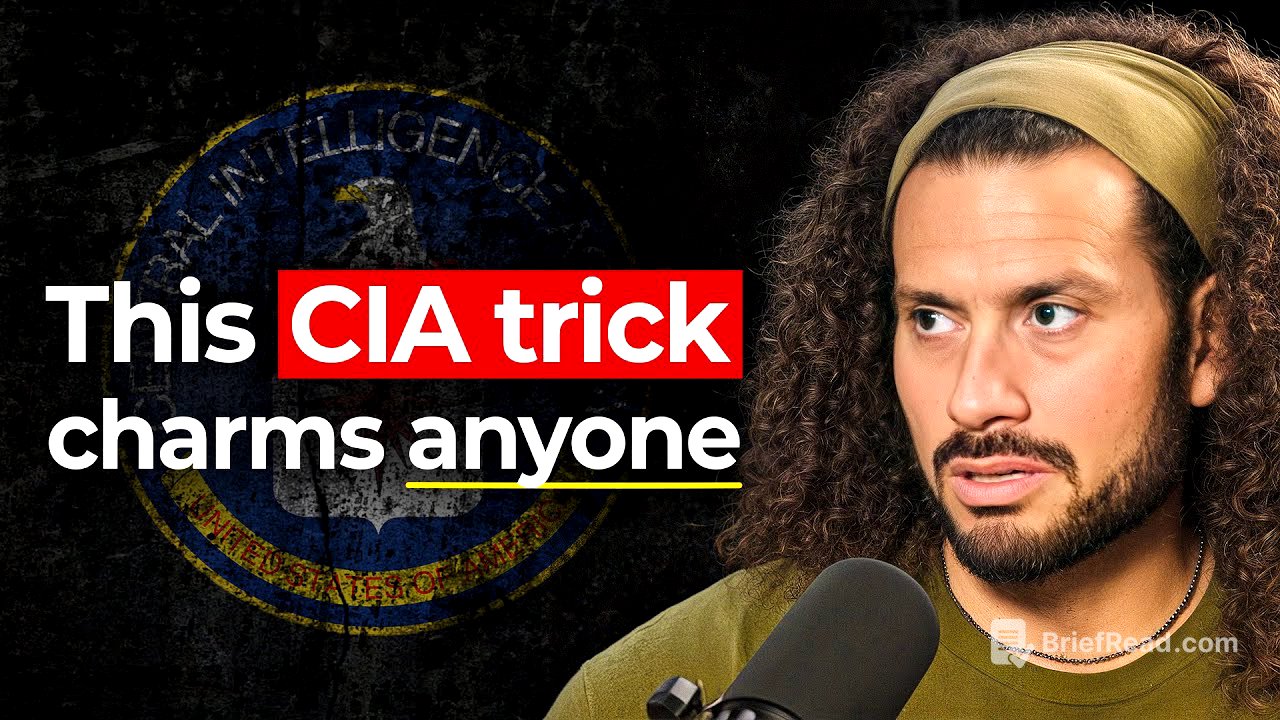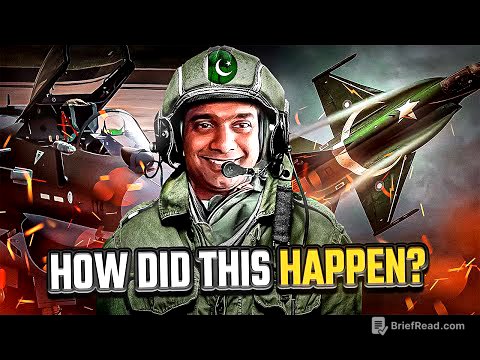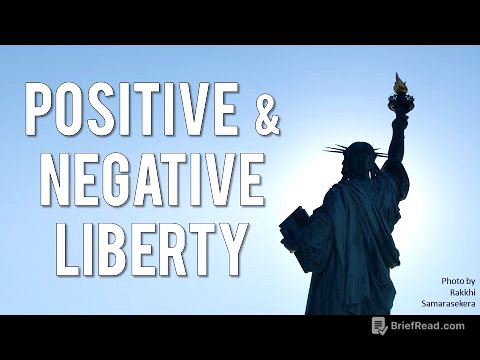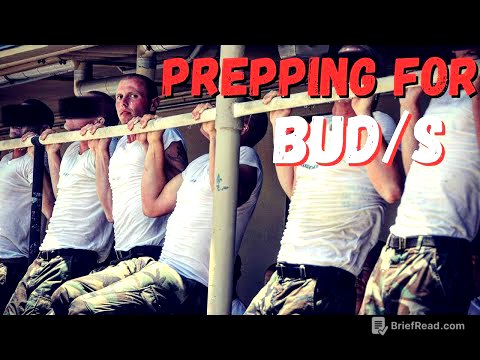TLDR;
This YouTube video features an interview with Andrew Bustamante, a former CIA spy, who shares insights and experiences from his time in the agency. The discussion covers a wide range of topics, including human nature, espionage tactics, international relations, and personal reflections on his career and future plans.
- The CIA taught Andrew that there is no good or bad, only constructive and destructive consequences.
- Relationships are transactional, and people are motivated by self-interest.
- The most powerful weapon in the CIA is the perception of connection.
- Andrew plans to leave the US by 2027 due to concerns about the country's identity crisis and the well-being of his family.
Intro [0:00]
Jack Neil introduces Andrew Bustamante, a former CIA spy and expert in psychological warfare. He highlights Andrew's experience in recruiting foreign assets and gathering intelligence. The episode promises to reveal Andrew's secrets, tactics, and reasons for wanting to leave America by 2027.
What Did the CIA Teach About Human Nature? [1:40]
Andrew explains that the CIA taught him to view people not as good or bad, but as constructive or destructive. He emphasizes that consequences are either productive or destructive, and this perspective helps to understand international relations. He focuses on self-interest in relationships, viewing them as transactions where both parties should benefit. He argues that even motherhood, initially a resource drain, becomes fulfilling when positive interactions with the child increase.
How Christianity Has Affected Andrew’s View of the World [5:13]
Andrew discusses how his Christian faith, since being saved in 2004, has shaped his worldview. He notes that his experiences outside the United States have shown him the flawed nature of humanity. He now interprets the Bible as highlighting that everyone is inherently flawed, and the goal is to work against these instincts. He finds liberation in accepting his imperfections and focusing on honoring God.
Why You Should Never Trust a Quiet Person [7:40]
Andrew recalls a Reddit AMA where he advised not trusting quiet people. He explains that in a society that values talking and earning validation, quiet people are often overlooked. However, the CIA taught him that quiet individuals absorb information while disclosing nothing, gaining a strategic advantage. He distinguishes between natural introverts and trained individuals who consciously remain silent to gather information.
Andrew Shares Some Specific Methods to Learn Body Language [10:45]
Andrew discusses how his skills in observing body language have grown over time, with the initial technical training giving way to nuanced mastery. He notes that after leaving the CIA, he found that ordinary people, unlike trained adversaries, are more responsive to these techniques. He compares operating against counterintelligenced individuals to operating in a different culture, highlighting the significant shift in communication styles.
Why Facial Micro Expressions Only Work in Interrogation Rooms [13:50]
Andrew differentiates his field intelligence collection from Chase Hughes' controlled interrogation environment. He explains that micro expressions are only reliable in interrogations where baselines can be established and controlled. In field operations, environmental factors and the subject's awareness complicate facial analysis. He uses the example of blink rate to illustrate how external conditions can affect facial cues, making accurate interpretation challenging.
What Can You Tell About a Person By Looking at Their Face? [16:20]
Andrew explains that in field operations, it's difficult to gather much information just by looking at someone's face due to environmental factors and the subject's awareness of being observed. He uses the example of approaching someone to illustrate how interrupting their mental flow can lead to misinterpretations. He notes that individuals with higher IQs may take longer to process information, leading to prolonged periods of discomfort or confusion.
Why People With High IQ Take Longer to Process Social Interactions [19:20]
Andrew clarifies that it's not just IQ but overall cognitive capability that affects processing speed. He explains that individuals with high cognitive abilities may have slower processing speeds because they absorb more information before making conclusions. He also notes that neural networks connect faster on frequently encountered tasks, affecting learning speed regardless of IQ.
The Strange Methods the CIA Uses to Train Agents [21:05]
Andrew describes the "free cup of coffee" exercise at the CIA's farm, where trainees must get a stranger to buy them a cup of coffee worth more than $3 without directly asking or trading. The goal is to create the perception of value that exceeds the cost of the coffee. He explains that this involves understanding the target's values and providing them with something they lack, such as attention or social equity.
Andrew Shares Some Frameworks to Reveal Someone's True Motivations [25:15]
Andrew introduces the RICE framework (Reward, Ideology, Coercion, Ego) to identify core motivations. Reward involves tangible incentives, ideology relates to subjective beliefs, coercion includes negative motivators like shame and fear, and ego pertains to how individuals view themselves and want to be viewed. He asserts that ideology is the strongest motivator, capable of driving extreme actions.
Andrew Breaks Down The Elon/Trump Feud [31:25]
Andrew analyzes the feud between Elon Musk and Donald Trump, attributing it to a miscalculation by Musk, who assumed that helping Trump would result in reciprocal assistance. He suggests that Trump, with a large ego, felt no obligation to help Musk. He advises understanding the motivations behind individuals with large egos and assessing the available leverage before engaging.
How CIA Agents and Entrepreneurs Are Extremely Similar [34:50]
Andrew notes the similarities between CIA case officers and entrepreneurs, including their risk tolerance, vision, and mindset. He emphasizes that entrepreneurs should focus on aligning with the vision of those they work with, demonstrating how their involvement can lead to faster and more successful outcomes. He also points out that entrepreneurs can learn from CIA field officers, particularly in listening and asking pointed questions to gather intelligence.
How Can You Tell If Someone is Trying to Manipulate You? [39:50]
Andrew advises avoiding business with coercive individuals, as their behavior indicates immaturity and a potential house of cards built on shame and fear. He explains that manipulation is emotionally based, and strong feelings during a conversation should trigger awareness. He distinguishes between emotional and logical appeals, noting that emotional appeals are more indicative of manipulation.
How Can You Tell if You’re Being Spied On? [43:30]
Andrew outlines different types of espionage, including physical observation, digital observation (imagery and data collection), and secondary observation through contacts. He notes that secondary collection is often the starting point to avoid alerting the primary target. He concludes that it's difficult to know if you're being spied on and that once targeted, it's challenging to escape collection efforts.
Why US Citizens Are Extremely Vulnerable to Spies [45:55]
Andrew estimates that 250,000 to 500,000 individuals in the United States are targets of active intelligence collection by foreign nations. He explains that the US is a permissive environment due to its citizenship laws and focus on individual rights, making it easier for foreign operators to operate.
Are There Any Countries The CIA Can’t Spy On? [47:40]
Andrew identifies North Korea, Belarus, and Iran as denied areas where US citizens cannot enter due to policy or security concerns. He explains that while the CIA has methods to operate in these countries, the restrictions make intelligence gathering more challenging.
Why Can’t Putin Launch a Nuclear Weapon? [50:00]
Andrew explains that Putin's inability to launch a nuclear weapon stems from the significant geopolitical blowback and the availability of alternative deployment methods with plausible deniability. He suggests that Putin could use proxy groups or smuggled weapons to achieve the same effect without directly implicating Russia. He emphasizes that nuclear deployment requires a confusing scenario to allow for de-escalation.
Is There a Possibility We Will See a Nuclear Weapon Deployed in Our Lifetime? [53:10]
Andrew believes that launching a nuclear missile is improbable due to early warning detection systems. However, he expresses concern about smuggled or dirty nukes, which are harder to detect and prevent. He notes the existence of tactical nuclear warheads that are small and easily transportable.
Who Has the Most Powerful Intelligence Agency in the World? [55:45]
Andrew identifies the CIA as the most powerful intelligence agency holistically due to its broad spectrum of capabilities and funding. However, he notes that other agencies, like MSAD, may be more dangerous due to their willingness to use lethal force. He also highlights China's massive informal intelligence network and Pakistan's ISI's use of terrorist tactics.
Who Has the CIA the Hardest Time Recruiting? [1:01:25]
Andrew identifies Russians, Chinese, Iranians, and Belarusians as hard targets for CIA recruitment due to their resistance to American methods. He notes that culture plays a significant role in susceptibility. He acknowledges that while the CIA is not very diverse, foreign countries have attempted to infiltrate the agency with ethnically blended individuals.
What’s the Most Powerful Weapon in the CIA? [1:07:20]
Andrew asserts that the most powerful weapon in the CIA is the perception of genuine connection or attention, as human connection is a fundamental psychological requirement. He explains that filling a missing relationship in a person's connection web grants incredible long-term power.
Is Sex More Effective Than Coercion for Spies? [1:10:30]
Andrew argues that sex is merely a shortcut to human connection, which is difficult to achieve genuinely. He explains that sex is not an effective tool for gathering information in the field, as American laws prevent forced sexual acts. He notes that while some countries use sexual exploitation, the US avoids it due to legal and blowback implications. He also discusses gender and cultural stereotypes in intelligence gathering, emphasizing the need to leverage them strategically.
How Do You Know If Someone in Your Family is a Spy? [1:18:35]
Andrew describes the three types of CIA officers: overt, covert, and seconded. He explains that it's challenging to determine if a family member is affiliated with intelligence, but signs include secretiveness, foreign connections, and ties to government regulations.
How CIA Agents Tend to Find Love? [1:23:30]
Andrew notes that it's common for CIA officers to marry other members of the agency, as the agency facilitates these relationships. However, marriage is relatively rare due to career sacrifices and the agency's desire to maintain control. He explains that most agency relationships involve an agency officer and a non-agency partner.
How Are CIA and Criminals Similar? [1:28:00]
Andrew explains that CIA officers are given legal protection to carry out illicit activities, acting like criminals without being held liable. He notes that this protection extends to espionage, border crossing, false identities, and illicit money transfers.
What is the Most Extreme Disguise Andrew Has Worn on the FIeld? [1:31:40]
Andrew reveals that the most extreme disguises he's worn involve light prosthetics like false mustaches and ear lifts. He explains that most costumes are hokey and basic, designed to be convincing from a distance. He notes that heavily prosthetic disguises are technically difficult and risky.
What is the Most Interesting Gadget, Tools. Weapons Used by the CIA? [1:35:55]
Andrew states that the most interesting gadgets are heavily classified. He notes that the CIA is always on the cutting edge of technology, often paying contractors to develop it. He explains that most technology is used to improve war fighter capability or secure communication, rather than weapons tech.
Does the CIA Have Influence in Social Media? [1:38:00]
Andrew explains that the CIA's influence on social media is indirect. Social media companies, to avoid government intervention, hire former CIA officers to detect and intervene against foreign intelligence threats. These teams often take a hyperconservative approach, throttling content that appears suspicious. He uses the example of pro-Palestinian content and COVID-related misinformation to illustrate this.
Andrew Shares His Most Horrific Experiences While Serving the CIA [1:47:00]
Andrew shares that his most horrific experiences involved children, recalling his mother's decision to avoid pediatric nursing due to the suffering of children. He recounts seeing child soldiers, children raising children, and overpopulated orphanages. He emphasizes the privilege of childhood in the West and the need to protect it.
How Andrew Often Hints Secrets He is Not Supposed to Share [1:57:25]
Andrew admits to dropping subtle hints about classified information, driven by his mission to increase disclosure without compromising national security. He acknowledges receiving both positive and negative feedback from the CIA for his actions.
How The CIA Interfered With One of Andrew’s Book [1:59:00]
Andrew expresses frustration that the CIA classified the location of his book memoir, limiting its impact. He believes that Americans would gain more than adversaries from knowing the location. He describes the collaborative but challenging process of submitting the book to the CIA for edits.
Why Andrew Is Determined to Leave the US by 2027 [2:04:15]
Andrew clarifies that he is planning to leave the US by 2027 as a priority goal, not out of desperation. He explains that the US is undergoing a transition and identity crisis, and he must prioritize his family's well-being. He believes that being an American in Europe or Australia offers opportunities not available in the US, such as reduced political extremism and access to international schools.
Who’s the Most Impressive Person You’ve Ever Met? [2:16:00]
Andrew shares the story of a CIA officer who consistently prioritized America's interests over personal gain. He describes this officer's dedication, sacrifices, and unwavering commitment to his mission, despite personal loneliness and hardship.
What’s the Best Piece of Advice You’ve Ever Received? [2:21:10]
Andrew recalls advice from a colonel who told him, "You can't succeed with a trail of dead bodies behind you." He explains that this advice changed his behavior from resolving conflict by taking it to the decision-maker to leaning into collaboration. He learned that most people have noble intent and that collaboration is essential for success.









